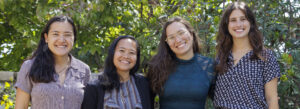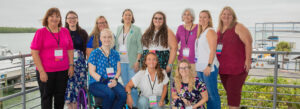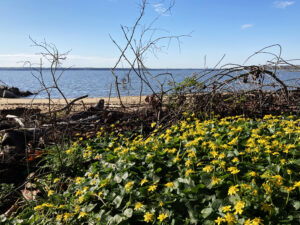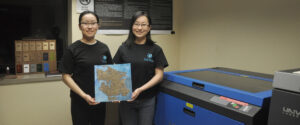
VASG Fellows Highlight Their Research Accomplishments During Online Session at ODU
VASG Fellows Highlight Their Research Accomplishments During Online Session at ODU By Ashley Tims & Lisa Eddy | Virginia Sea
By Alessandra Burgos | 2019 Knauss Fellow
The following blog post is by Alessandra (Ali) Burgos, a 2019 Sea Grant Knauss Fellow hosted by the National Centers for Coastal Ocean Science (NCCOS). Burgos is sponsored through Virginia Sea Grant and recently graduated from Old Dominion University with an M.S. in physical oceanography from the Department of Ocean, Earth and Atmospheric Sciences. Burgos earned a B.S. in meteorology from Rutgers University.
I came to CCPO in 2016 as a master’s student studying sea level rise. After graduating this past December, I left to start a Sea Grant Knauss fellowship in Washington, D.C. As sad as I was to leave Norfolk and my fellow graduate students, I was excited to start a new chapter in the policy world.
I was placed into the National Centers for Coastal Ocean Science (NCCOS) line office within NOAA. I was brought in to support NCCOS’ work on coastal resiliency and develop congressional engagement strategies. What that actually entailed, however, I slowly learned over my first two months. NCCOS funds internal (NCCOS scientists) and external (academic researchers) scientists through grants to provide and support science solutions for coastal regions throughout the nation. These science solutions are directly aimed to help decision-making regarding a large range of topics, such as harmful algal blooms and sea level rise. In my position, I have been able to see how the grant management process works, and how to engage with congressional leaders on Capitol Hill. I now fully understand why everything takes so long with the government!
I have learned a lot about how the government works through this fellowship. One being that, because I work for an executive office, we are not allowed to lobby for ourselves and must support the current administration’s goals/budget. I think that this aspect of government was very eye-opening for me. As a public citizen, though, I am learning many ways that the public can be involved, which is much more than I thought possible. One way is that anyone can go and sit in on briefings and hearings at senate buildings. Also, websites, like the Federal Register, lists pending bills, which are open to public comment. There are different ways for people’s voices to be heard, but these avenues are generally not promoted.
One of the main reasons I went into this fellowship was to learn how to communicate science to policy makers and see that science put into action. In a sense, I stumbled my way into this fellowship, but many of my experiences helped me more than I thought. Taking communication classes/workshops, being active in our graduate student organization, and seeking out environmental policy classes from different universities, all helped me slowly hone the skills that are useful and needed for understanding the intricacies of working in a political field.
The fellowship has allowed me to take part in a large range of personal development events, such as attending a marine spatial planning class in Nova Scotia in May, and facilitation and science communication trainings. For my job, I have had the opportunity to travel to Beaufort, NC and Gulf Shores, AL, with several more trips lined up throughout the year. Every day there is a little something new going on, so it keeps me busy. The Knauss fellowship has been amazing experience so far and I have met so many fascinating people. It has easily opened up the door for me, such as sitting in on briefings on the Hill or getting onto a NPR science podcast. I miss the Hampton Roads area, but I hope that my work can help the area out in the future.
By Alessandra Burgos
Photos contributed by Alessandra Burgos
This blog post was originally published in the Fall 2019 CCPO Circulation, a publication of the Center for Coastal Physical Oceanography at Old Dominion University.

VASG Fellows Highlight Their Research Accomplishments During Online Session at ODU By Ashley Tims & Lisa Eddy | Virginia Sea

Community, Inclusivity, and Connection: Reflecting on the 2023 Women of the Water Conference By Kaitlyn Theberge | Virginia TechBy Hayley Lemoine | Florida

The Virginia Sea Grant Commonwealth Coastal & Marine Policy Fellowship has given me the opportunity to learn some more broadly practical jargon.

“We realized that the VA SEA lesson plan project could provide a great opportunity to create a lesson plan for K-12 students and teachers around the globe based on our current research. “

Your request has been submitted.
Stay up-to-date on fellowship, internship, training, and research funding opportunities offered by Virginia Sea Grant.